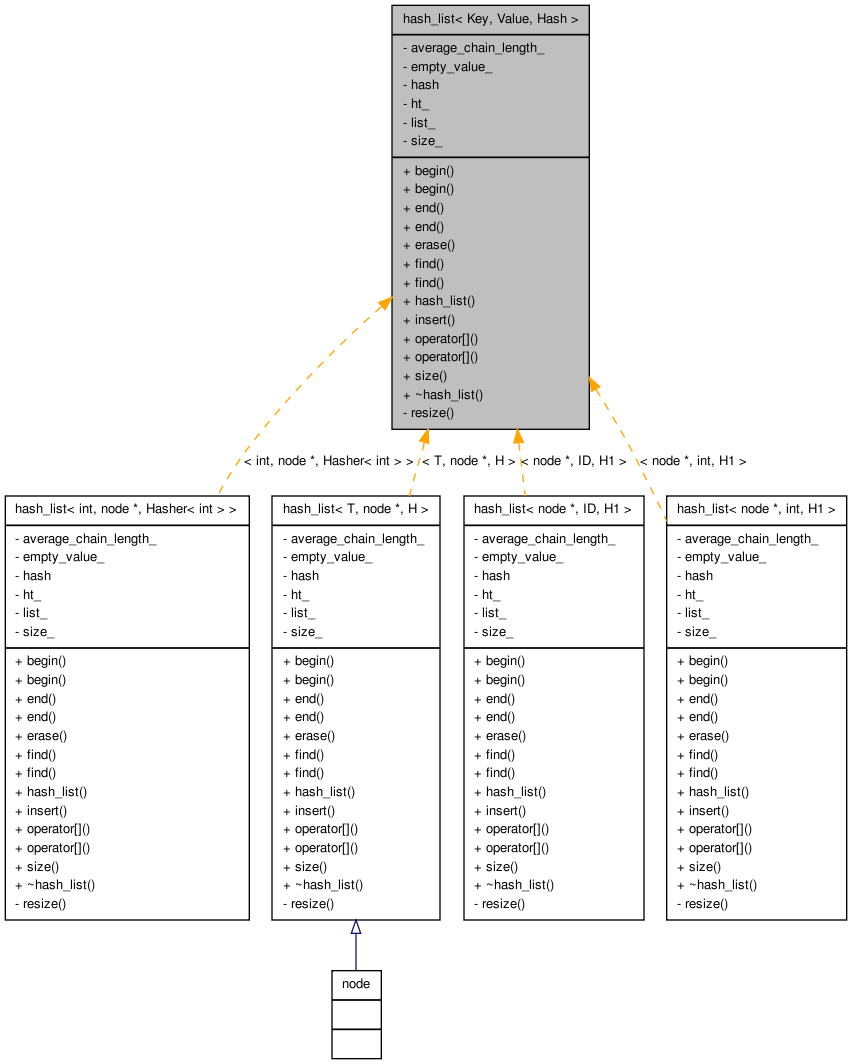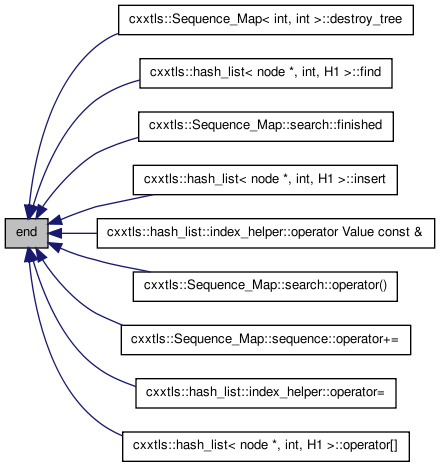hash_list< Key, Value, Hash > Class Template Reference
A hash_list<Key,Value,Hash> is a list of pair<Key,Value> which can be quickly searched for a given K. Most operations are of fixed cost. Memory consumed is approximately 3 * sizeof(void*) + sizeof(K) + sizeof(V). The primary storage mechanism is a list of Key,Value,bucket_next objects. This gives O(1) insert, erase, iteration, etc. The 'bucket_next' member kept with the Key,Value pair lets us have a fixed time cost to find a given K -- there is a hash table containing all Keys -- this table's buckets thread through the individual objects stored in the linked list. More...
#include <hash_list.h>


Classes | |
| struct | index_helper |
| When using a non-const hash_list, and invoking the array index operator, [], you get back an index_helper object rather than a reference to the Value object you would expect to be gettting. This is because the behaviour of the array index operation requires that if the object isn't there already that it be inserted. You could insert a 'default' Value object into the container, only to have it deleted if you are writing code like this: More... | |
| struct | value_type |
| The objects actually stored in a hash_list are 'value_type' objects. The member, data_, contains the pair<Key,Value> that is the user data provided by an insert operation. More... | |
Public Types | |
| typedef List::const_iterator | const_iterator |
| std STL style const_iterator | |
| typedef List::iterator | iterator |
| std STL style iterator | |
| typedef std::list< value_type > | List |
| the primary storage representationt ype | |
| typedef std::pair< Key, Value > | mapped_type |
| Data you should think about as being in the hash_list. Actually, this is only part of the real 'value_type'. | |
| typedef hash_list< Key, Value, Hash > | self |
| typedef std::vector< value_type * > | Vector |
| the collection of buckets | |
Public Member Functions | |
| const_iterator | begin () const |
| iterator to first element in the list | |
| iterator | begin () |
| iterator to first element in the list | |
| const_iterator | end () const |
| iterator to end element of the list | |
| iterator | end () |
| iterator to the end element of the list | |
| void | erase (iterator location) |
| Remove one element from the list at the specified location. Used like this: | |
| const_iterator | find (Key const &index) const |
| iterator | find (Key const &key) |
| given a Key value, get an interator to the hash_list::value_type object that contains that key. | |
| hash_list (int chain_length=10) | |
| iterator | insert (mapped_type const &data) |
| Insert a Key/Value pair. When inserting, you must supply a hash_list::mapped_type object. Used like this: | |
| index_helper | operator[] (Key const &index) |
| Array index operator. returns a Value given its Key. | |
| Value const & | operator[] (Key const &index) const |
| Array index operator. returns a Value given its Key. When the hash_list is const, then this function just returns a const& to either the object in the list or to the empty_value_ object for this hash_list. | |
| size_t | size () const |
| number of items in the container | |
| ~hash_list () | |
| destructor | |
Private Member Functions | |
| void | resize () |
Private Attributes | |
| size_t | average_chain_length_ |
| when size_/ht_.size() > acl, resize vector_ | |
| Value | empty_value_ |
| returned by the const array index operator when no object with a given key is specified | |
| Hash | hash |
| function which gives you hashes of the Key | |
| Vector | ht_ |
| hash buckets | |
| List | list_ |
| primary storage | |
| size_t | size_ |
| cache length of list_ | |
Friends | |
| class | index_helper |
Detailed Description
template<class Key, class Value, class Hash = Hasher<Key>>
class cxxtls::hash_list< Key, Value, Hash >
A hash_list<Key,Value,Hash> is a list of pair<Key,Value> which can be quickly searched for a given K. Most operations are of fixed cost. Memory consumed is approximately 3 * sizeof(void*) + sizeof(K) + sizeof(V). The primary storage mechanism is a list of Key,Value,bucket_next objects. This gives O(1) insert, erase, iteration, etc. The 'bucket_next' member kept with the Key,Value pair lets us have a fixed time cost to find a given K -- there is a hash table containing all Keys -- this table's buckets thread through the individual objects stored in the linked list.
There can be only element in the container with a given Key value.
The template parameters are as follows:
- Key -- an object which is the search key into the list.
- Value -- an object which is assumed to be associated with the key.
- Hash -- a functor object with a function call operator method which will give an 'int' given a 'Key'. The performance of the container is directly proportional to the uniqueness of the mapping between keys and values. If lots of Keys give the same 'int' value, then performance of this class will be poor. You probably want to user the template found in <Hashs> for built in types, and follow the implementation examples their for your own classes.
Here is an example use:
struct IntHash // or use Hasher<int> from file <hashers> { int operator() (int value ) { return value; } }; typedef hash_list<int,string,IntHash> Container; Container hl; hl.insert(Container::mapped_data(9, "stuff")); Container::iterator nine = hl.find(9); string stuff = nine->second;
Be careful when writing Hash's. It is tempting to write a generic Hash algorithm that simply takes any kind of object and adds up the bytes in it. This won't work because of alignment holes put into the structure by the compiler -- and for other reasons. You should make the Hash's return value be dependent ONLY on the actual usuable fields in a structure -- and it should be written to run very quickly. A Hash's function call operator can not be a static method If you have data in the Hash, remember to make its copy constructor and destructor work correctly.
Here is a trivial example of hashing a string:
/
struct StringHash // or use Hasher<std::string> from file <hashers>
{
int operator() (string s)
{
int rv = 0;
string::const_iterator f = s.begin();
string::const_iterator l = s.end();
while(f != l) rv += *f++;
return ( (rv << 8) | s.size() );
}
};
Definition at line 47 of file hash_list.h.
Member Typedef Documentation
| typedef List::const_iterator const_iterator |
std STL style const_iterator
Definition at line 164 of file hash_list.h.
| typedef List::iterator iterator |
std STL style iterator
Definition at line 163 of file hash_list.h.
| typedef std::list<value_type> List |
the primary storage representationt ype
Definition at line 160 of file hash_list.h.
| typedef std::pair<Key,Value> mapped_type |
Data you should think about as being in the hash_list. Actually, this is only part of the real 'value_type'.
Definition at line 131 of file hash_list.h.
Definition at line 128 of file hash_list.h.
| typedef std::vector<value_type*> Vector |
the collection of buckets
Definition at line 161 of file hash_list.h.
Constructor & Destructor Documentation
| hash_list | ( | int | chain_length = 10 |
) |
Definition at line 176 of file hash_list.h.
| ~hash_list | ( | ) |
destructor
Definition at line 195 of file hash_list.h.
Member Function Documentation
| const_iterator begin | ( | ) | const |
iterator to first element in the list
Definition at line 205 of file hash_list.h.
| iterator begin | ( | ) |
iterator to first element in the list
Definition at line 202 of file hash_list.h.

| const_iterator end | ( | ) | const |
iterator to end element of the list
Definition at line 206 of file hash_list.h.
| iterator end | ( | ) |
iterator to the end element of the list
Definition at line 203 of file hash_list.h.

| void erase | ( | iterator | location | ) |
Remove one element from the list at the specified location. Used like this:
hash_list<t>::iterator location = hl.find(some_key); hl.erase(location);
Definition at line 246 of file hash_list.h.

| const_iterator find | ( | Key const & | index | ) | const |
- Returns:
- an iterator to the entry with the specified key
- Parameters:
-
index the entry being searched for
Definition at line 347 of file hash_list.h.
| iterator find | ( | Key const & | key | ) |
given a Key value, get an interator to the hash_list::value_type object that contains that key.
Definition at line 293 of file hash_list.h.

| iterator insert | ( | mapped_type const & | data | ) |
Insert a Key/Value pair. When inserting, you must supply a hash_list::mapped_type object. Used like this:
hl->insert( hash_list::mapped_type(key,value) );
Definition at line 208 of file hash_list.h.

| index_helper operator[] | ( | Key const & | index | ) |
Array index operator. returns a Value given its Key.
Definition at line 497 of file hash_list.h.
| Value const& operator[] | ( | Key const & | index | ) | const |
Array index operator. returns a Value given its Key. When the hash_list is const, then this function just returns a const& to either the object in the list or to the empty_value_ object for this hash_list.
- Returns:
- a reference to the desired object
- Parameters:
-
index the key value of the desired object
Definition at line 358 of file hash_list.h.
| void resize | ( | ) | [private] |
Increases the size of the hash table to speed up find operations. This recreates the mapping between items in the list and hash buckets to preserver the hashtable logic.
Definition at line 511 of file hash_list.h.

| size_t size | ( | ) | const |
number of items in the container
Definition at line 200 of file hash_list.h.

Friends And Related Function Documentation
friend class index_helper [friend] |
Definition at line 494 of file hash_list.h.
Member Data Documentation
size_t average_chain_length_ [private] |
when size_/ht_.size() > acl, resize vector_
Definition at line 169 of file hash_list.h.
Value empty_value_ [private] |
returned by the const array index operator when no object with a given key is specified
Definition at line 123 of file hash_list.h.
Hash hash [private] |
function which gives you hashes of the Key
Definition at line 172 of file hash_list.h.
hash buckets
Definition at line 171 of file hash_list.h.
primary storage
Definition at line 170 of file hash_list.h.
size_t size_ [private] |
cache length of list_
Definition at line 168 of file hash_list.h.
The documentation for this class was generated from the following file:
- include/cxxtls/hash_list.h
 1.6.3
1.6.3